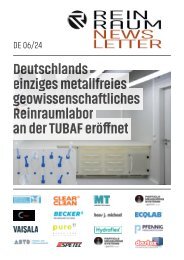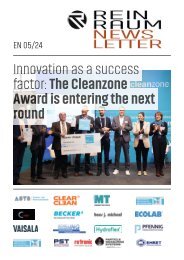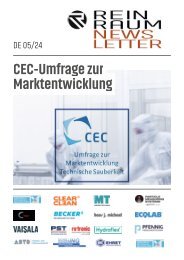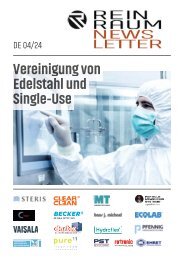Newsletter_12-2022_EN
Fachbeiträge, redaktionelle Beiträge und Veranstaltungen In einer sich schnell entwickelnden Branche sind aktuelle Informationen wichtig. reinraum online bietet einerseits Interessierten die Möglichkeit, sich aktuell und umfassend über die Reinraum-Branche zu informieren. Andererseits können Unternehmen und Personen die Plattform nutzen, Fachbeiträge, redaktionelle Artikel und Firmennews zu veröffentlichen. Ein Veranstaltungskalender ergänzt das Informationsangebot. Der ExpertenPool hilft bei der Profi-Suche: WER macht WAS im Reinraum.
Fachbeiträge, redaktionelle Beiträge und Veranstaltungen
In einer sich schnell entwickelnden Branche sind aktuelle Informationen wichtig. reinraum online bietet einerseits Interessierten die Möglichkeit, sich aktuell und umfassend über die Reinraum-Branche zu informieren. Andererseits können Unternehmen und Personen die Plattform nutzen, Fachbeiträge, redaktionelle Artikel und Firmennews zu veröffentlichen. Ein Veranstaltungskalender ergänzt das Informationsangebot.
Der ExpertenPool hilft bei der Profi-Suche: WER macht WAS im Reinraum.
You also want an ePaper? Increase the reach of your titles
YUMPU automatically turns print PDFs into web optimized ePapers that Google loves.
www.reinraum.de<br />
NEWSLETTER<br />
www.cleanroom-online.com Edition <strong>EN</strong> <strong>12</strong>-<strong>2022</strong> | Page <strong>12</strong>/42<br />
Standards are here to stay<br />
You may not always notice when standards are in place, but they are present everywhere. World Standards Day on 14 October marked the<br />
75th anniversary of the founding of the International Organization for Standardization (ISO). Switzerland has been a member of ISO since<br />
the beginning and still holds substantial weight within the organisation.<br />
Urs Fischer, CEO of the Swiss Association for Standardization (SNV),<br />
knows that Switzerland has a powerful voice when it comes to the<br />
standards process in international committees. This applies not only<br />
to traditional topics such as ski bindings, cable cars or mechanical engineering,<br />
but also in other areas such as leadership principles and<br />
management issues. Swiss experts have the option of participating<br />
in standards committees within many sectors. The SNV actively calls<br />
for collaboration in the relevant professional groups. The idea is for<br />
people with the pertinent experience to set and examine practicable<br />
standards and then to adapt them later as necessary. Leading the development<br />
and monitoring process is the task of the SNV. It serves as<br />
a hub for standards and provides a link to international committees.<br />
Standards are not laws<br />
In our buildings and in our infrastructure, as well as in nearly every product<br />
available, standards are being put into practice. But what do they<br />
do? Standards allow for more efficient production, administration and<br />
storage. They lead to better compatibility between technical devices<br />
and equipment. They also encourage trust on the part of consumers.<br />
When standards are applied, it means that basic requirements are<br />
being met in regard to health, safety and the environment. As standards<br />
are checked every five years and revised as necessary, they remain<br />
up to date. They accommodate new areas or topics, for example,<br />
changes based on digitalisation or the inclusion of climate change<br />
as a forward-looking measure. They incorporate hot topics such as<br />
blockchains or megacities. They integrate social developments such<br />
as demographic changes or sustainability issues. In general, standards<br />
are widely accepted as they originate from practice and are created<br />
for practice. In certain instances, laws also refer to standards; in these<br />
cases standards take on a legally binding character. In all other cases,<br />
observing standards is voluntary because they are created by private<br />
organisations. However, as these organisations work closely with government<br />
bodies, standardisation is a good example of a successful<br />
Public-Private Partnership (PPP), a cooperative undertaking between<br />
the public and private sector.<br />
What does SN <strong>EN</strong> ISO 9001:2015 mean?<br />
The number 9001 refers to the standard for quality management. The<br />
year after the colon refers to when the revised version of the standard<br />
was published. If the standard is revised again, this year is replaced<br />
by the new publication date. Each standard is numbered using this<br />
system.<br />
ISO stands for International Organization for Standardization. Over<br />
165 countries worldwide are currently represented in ISO. The organisation‘s<br />
head office is in Geneva. ISO standards are developed for the<br />
global market. Switzerland is a member of this organisation and can

















